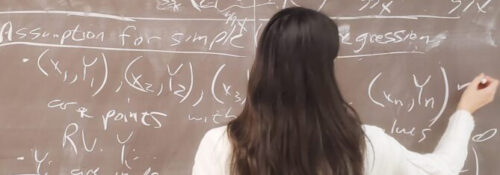
Multiplying Wonder: The Unexpected Beauty of Math
Written by Emily Marsh
If you would’ve told me in high school that I would study math in college, I would not have believed you. I never thought of myself as a mathematically minded person. My relationship with math changed during my senior year of high school when I took Calculus I.
My calculus teacher taught me to appreciate the rigor and method behind math. She was clear in her teaching and frequently explained the rationale behind a particular mathematical theorem. I started to realize the beauty in the calculus system. Beyond the practical aspects of calculus, I was fascinated by the way the whole discipline was focused around certain themes. No concept seemed random or out of place, and they all abided by the internal laws of the calculus system. Finally, I had a glimpse of the bigger picture behind math.
My first week at Hillsdale, I met with my assigned freshman advisor, who happened to be in the Economics Department. I told him I wanted to study economics in graduate school. He told me to keep taking math classes during my four years here because most economics graduate schools require a high level of proficiency in math. Determined to succeed, I gritted my teeth and declared a double major in math and economics at the beginning of my sophomore year.
Over the years, I’ve learned to cope with the imposter syndrome of being a math major. I know that I have to work hard in my math classes, but I no longer feel exasperated with homework problems. The overlooked fact of math, I’ve learned, is that it is a constant process of preparation. Working through math concepts in the present has made me an analytical and systematic thinker for the future.
I’ve noticed this firsthand in Abstract Algebra. At the beginning of the term, a seven problem homework set easily took ten hours to complete, with a visit to office hours. By the end of the term, a similar homework set took five or six hours to complete. Through wrestling with math in the present, I’ve learned to be more creative in my problem solving, more rigorous in my proofs, and more systematic in my thinking. Because of this, Abstract Algebra, the most challenging class I’ve taken at Hillsdale, has snuck onto my list of favorite classes.
I have spent a lot of time in my professors’ office hours. Their patient teaching in and outside of the classroom has made all the difference in my learning. To go to a professor knowing that my best idea on a problem is not even close can be a terrifying experience. Happily, the Hillsdale math professors have always patiently tutored me; I leave with a deeper understanding of the math problem and a satisfaction in having had an interesting and insightful conversation. The professors are happy to help and mentor through the fog. They have made the major accessible to me, and I am very grateful to them.
Math itself is a very beautiful but complex field. It is highly methodical, but can be incredibly difficult. However, math offers the privilege to uncover a small part of the language inherent in the universe. Through math, I believe we can foster an appreciation for the complexity of the Creator of this world. These are not the lessons I anticipated learning during my college years, but even when the math homework is long and hard, I am grateful for how the Mathematics Department at Hillsdale has catalyzed my growth. I have not only become a more analytical thinker, but have been grateful to be filled with wonder by the person who both created math and brought me to it.
Read more here:
https://www.hillsdale.edu/hillsdale-blog/academics/mathematics-poetry/
https://www.hillsdale.edu/hillsdale-blog/academics/mathematics-common-core/
 Emily Marsh, ’23, studies economics and mathematics. She is a self-diagnosed coffee addict, and she loves the water, meeting new people, and writing (on the good days). Her favorite part of being on campus is people watching when she’s supposed to be doing homework.
Emily Marsh, ’23, studies economics and mathematics. She is a self-diagnosed coffee addict, and she loves the water, meeting new people, and writing (on the good days). Her favorite part of being on campus is people watching when she’s supposed to be doing homework.
Published in March 2022